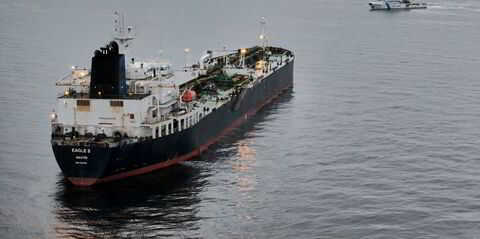Automated systems can do only so much to guide shipping companies through the thicket of sanctions on Russia, according to MIS Marine.
TradeWinds reporters across the globe are covering the shipping implications on the Russia-Ukraine crisis.
Dominic McKnight Hardy, managing director of the marine assurance and ship vetting software firm, told TradeWinds that with 200-plus sanctions emerging within a few days, charterers need to decide quickly which will be their deal-breakers and the fundamental basis for operational decisions.
While the sanctions themselves are black and white, McKnight Hardy argues that charterers need to figure out which sanctions will have the most impact on their stakeholders.
“For this reason, a traffic light system is just not viable in the current scenario — the Ukraine and Russian conflict cannot be oversimplified into red, amber, green statuses,” he said.
The initial global response was to place sanctions on companies related to key individuals, but the focus is now shifting to a general restriction or block on the purchase of Russian hydrocarbon cargoes, regardless of the ownership of the vessel.
“Bringing together multiple data sources for in-depth analysis creates indications of the source of the cargo to help charterers make appropriate decisions,” he said.
“So, although responding to the increasing sanctions is automated to an extent, what we’re seeing first-hand is the surge in demand for human intelligence.”
McKnight Hardy believes global oil majors face a situation that not only requires a comprehensive understanding of sanctions as they happen, but that also demands a daily level of analysis to establish their levels of risk exposure to the Russian market, based on specific products.
“Moreover, this business-critical information must be considered in tandem with other aspects of crew welfare and safety that require sensitivity and data in equal measure, which is a level of support that we are providing,” he said.
MIS Marine uses data relating vessel locations, voyage histories, vessel ownership and operation, as well as cargo and crew manifests.
How Russian is Russian?
Referring to the UK ban on Russian vessels, law firm Reed Smith’s shipping partner, Nick Austin, said identifying which ships are “Russian” is not as easy as it sounds.
“For example, under the current rules, a ship is not Russian just because it has Russian crew members or a Russian captain. For the rules to bite, there has to be a stronger link between Russia and the ownership and operation of the vessel itself,” he added.
Significant numbers of Russian-linked ships carrying crude oil and LNG call at UK ports each year, not to mention vessels carrying steel and other goods.
“Those ships and cargoes will now have to go elsewhere, or more likely never leave Russia at all, given the coordinated approach between governments,” Austin said.




